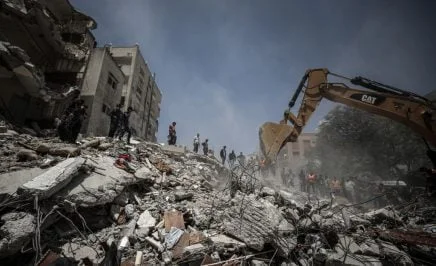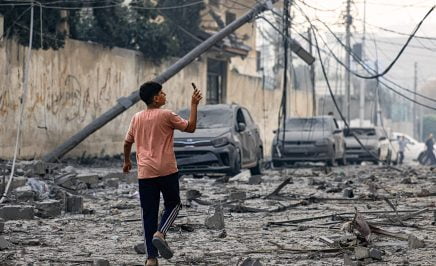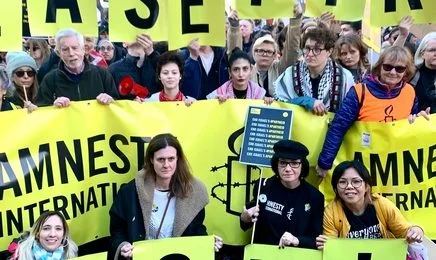Today marks 100 days of horrific violence in Israel and the Occupied Palestinian Territories. The scale of devastation and destruction, and the severity of human rights violations, is unprecedented.
These 100 days have been marked by a chilling disregard for human rights. On 7 October, Hamas and other Palestinian armed groups committed horrific attacks, deliberately killing civilians and taking civilian hostages, in direct violation of international humanitarian law. 100 days later, Israeli attacks have pummelled Gaza, pulverising street after street, killing civilians on an unprecedented scale.
Again and again, people around the world have called for a ceasefire, for the delivery of aid to Gaza, for an end to attacks on civilians. Today, there is no ceasefire and the people of gaza continue to face relentless bombardment. Israeli attacks kill and maim Palestinians in their thousands. Meanwhile, Western countries like the US publicly lament civilian deaths while providing the weapons that cause those deaths.
Where we are now
Misinformation and disinformation about the crisis is pervasive. The divide between the picture Israeli leaders attempt to paint for us and the reality we have evidenced at Amnesty International seems to widen by the day.
- Israel has cut people living in the occupied Gaza Strip off from food, fuel, electricity and water for over three months.
- Nearly 24,000 Palestinians have died and more than 58,000 have been injured following relentless bombardment by the Israeli Defence Forces (IDF).
- An estimated 70% of those killed or injured are women and children.
- The IDF is killing 250 people every day, far more than any other conflict in recent years.
- Almost 85% of the population has been displaced.

Gaza has become uninhabitable.
Israeli attacks continue to kill and injure hundreds of civilians in Gaza every day. In direct violation of international law, the IDF has repeatedly and deliberately attacked civilian infrastructure, like schools, hospitals, refugee camps and housing.
These attacks ensure that, even for those Gazans who survive the slaughter and manage to return home, their city won’t be able to sustain them. In December, we reported that bombing had damaged or destroyed nearly half of all housing. The situation has only deteriorated since then. Today, only 15 of Gaza’s 36 hospitals remain even partially functioning. As the UN humanitarian chief said recently, “Gaza has simply become uninhabitable.”
Israeli authorities are blocking humanitarian assistance.
The international community has repeatedly called for the unfettered delivery of humanitarian aid to the people of Gaza. People are lining up for hours to get drinking water, which is often dirty, and basic provisions like bread.
Many thousands are sick and injured. Overcrowding, lack of nutritious food, and poor sanitation mean that famine and disease outbreaks are looming.
While Israeli authorities have claimed to be facilitating aid to people in Gaza, aid organisations have regularly contradicted this. The World Health Organisation (WHO) had to cancel seven of its planned missions to Northern Gaza between 26 December and 10 January due to Israeli authorities denying access.
Last week, WHO director general, Tedros Adhanom Ghebreyesus said the situation for aid workers in Gaza was “indescribable”. They face nearly “insurmountable obstacles” to delivering humanitarian aid to Gaza.
“The barrier to delivering humanitarian aid to the people of Gaza is not the capabilities of the UN, WHO or our partners. The barrier is access.”
Dr Tedros Adhanom Ghebreyesus
What we’ve done
Since the escalation of hostilities in October, Amnesty International has been hard at work, both on the ground in Gaza and around the world. And with the support of our global community of passionate human rights defenders, we’ve achieved a lot.
With fieldworkers on the ground and experts in our Evidence Lab, we’ve documented and verified evidence of war crimes. We’ve campaigned for a ceasefire and for human rights to be protected, amassing over one million petition signatures worldwide within 37 days. We’ve amplified the voices of Palestinians, challenged disinformation and called out the dehumanisation of Palestinians.
From the White House in Washington DC to Hyde Park in Sydney, you’ve taken to the streets. You’ve gathered in the hundreds of thousands to speak truth to power, challenge injustice and support human rights.
And our voices have been noticed. Australia changed their position and supported a resolution calling for a ceasefire in the UN General Assembly after you took action. Today, the case unfolding in the International Court of Justice shows that we are succeeding in bringing war crimes into the light and changing the conversation.
The next 100 days
While we’ve chalked up real wins on the side of human rights, the situation for Palestinians only grows more desperate. Israeli authorities continue to ignore calls for a ceasefire, insisting their military campaign is far from over. Every day, the IDF is pulverising and killing its residents. Access for humanitarian aid remains hopelessly insufficient.
With no safe spaces left for Palestinians in Gaza, members of the Israeli government have suggested forcing civilians to leave Gaza. The entire population is at risk of forced displacement. And as fighting intensifies between the IDF and Hezbollah in Lebanon, and in the Red Sea. There are grave concerns that the conflict will spread to engulf neighbouring countries.
Now more than ever, we must take action and call for all parties to respect and protect human rights.
Today, Foreign Minister Penny Wong is travelling to Israel and the Occupied Palestinian Territories. We are urging her to reiterate Australia’s calls for a ceasefire and for the unfettered delivery of humanitarian aid for the people of Gaza during her visit. We know when you take action, it can make a difference.




